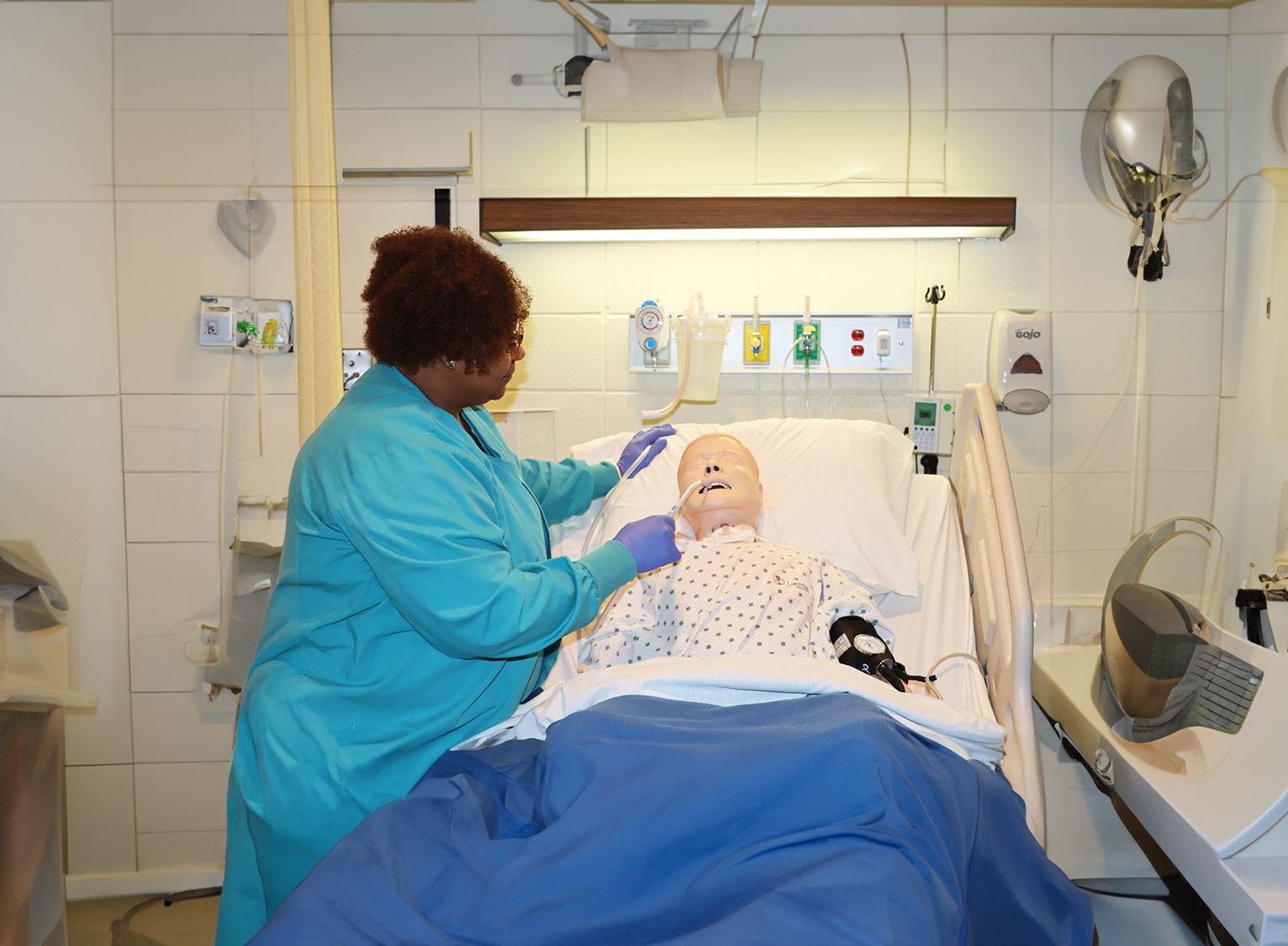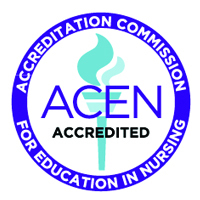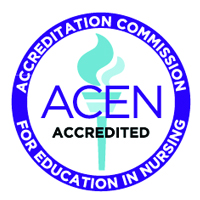Program graduates are eligible to submit an application to write the National Council Licensing Examination for Registered Nurses (NCLEX-RN). Applicants should be aware violation of any federal, state, or local drug law or conviction of a crime may preclude licensure as a registered nurse. The Arkansas State Board of Nursing requires a state and federal criminal background check before processing an application for initial licensure. Thus, graduation from the Associate Degree Nursing Program at Phillips Community College of the University of Arkansas does not guarantee approval from the Arkansas state Board of Nursing or from another respective state board of nursing to take the licensure examination. For Arkansas residents, please read in the Arkansas Nurse Practice Act, which can be accessed by clicking here. Clinical facilities may also require a criminal background check and/or drug test as a condition of clinical practice in the respective facility. If a clinical facility denies a student permission to participate in patient care in that facility and the student cannot be placed in another clinical agency, the student must withdraw from the nursing course.
The Associate Degree Nursing Program at Phillips Community College of the University of Arkansas meets the state education requirements for a registered nursing license in the states of Arkansas, Mississippi, and Tennessee. Phillips Community College of the University of Arkansas has not determined if the Associate Degree Nursing Program at Phillips Community College of the University of Arkansas meets the state education requirements in any other state, any U.S. Territory, or the District of Columbia. Contact the state regulatory agency for nursing in any other state for which this information is needed.
The National Council of State Boards of Nursing (NCSBN) has resources that may be helpful.
ARKANSAS STATE BOARD OF NURSING CRIMINAL BACKGROUND CHECKS
Graduation from the Associate Degree Nursing Program at Phillips Community College of the University of Arkansas does not guarantee approval from the Arkansas State Board of Nursing or from another respective state board of nursing to take the licensure examination.
For Arkansas residents, the following information is taken directly from the Arkansas Nurse Practice Act.
Licensing Restrictions Based on Criminal Records - A.C.A. § 17-3-102
(a) An individual is not eligible to receive or hold a license issued by a licensing entity if that individual has pleaded guilty or nolo contendere to or been found guilty of any of the following offenses by any court in the State of Arkansas or of any similar offense by a court in another state or of any similar offense by a federal court, unless the conviction was lawfully sealed under the Comprehensive Criminal Record Sealing Act of 2013, § 16-90-1401 et seq., or otherwise previously sealed, pardoned or expunged under prior law:
(1) Capital murder as prohibited in § 5-10-101;
(2) Murder in the first degree and second degree as prohibited in §§ 5-10-102 and 5-10-103;
(3) Manslaughter as prohibited in § 5-10-104;
(4) Negligent homicide as prohibited in § 5-10-105;
(5) Kidnapping as prohibited in § 5-11-102;
(6) False imprisonment in the first degree as prohibited in § 5- 11-103;
(7) Permanent detention or restraint as prohibited in § 5-11- 106;
(8) Robbery as prohibited in § 5-12-102;
(9) Aggravated robbery as prohibited in § 5-12-103;
(10) Battery in the first degree as prohibited in § 5-13-201;
(11) Aggravated assault as prohibited in § 5-13-204;
(12) Introduction of a controlled substance into the body of another person as prohibited in § 5-13-210;
(13) Aggravated assault upon a law enforcement officer or an employee of a correctional facility as prohibited in § 5-13-211, if a Class Y felony;
(14) Terroristic threatening in the first degree as prohibited in § 5-13-301;
(15) Rape as prohibited in § 5-14-103;
(16) Sexual indecency with a child as prohibited in § 5-14-110;
(17) Sexual extortion as prohibited in § 5-14-113;
(18) Sexual assault in the first degree, second degree, third degree, and fourth degree as prohibited in §§ 5-14-124 — 5-14-127;
(19) Incest as prohibited in § 5-26-202;
(20) Offenses against the family as prohibited in §§ 5-26-303 — 5-26-306;
(21) Endangering the welfare of an incompetent person in the first degree, as prohibited in § 5-27-201;
(22) Endangering the welfare of a minor in the first degree as prohibited in § 5-27-205;
(23) Permitting the abuse of a minor as prohibited in § 5-27- 221;
(24) Engaging children in sexually explicit conduct for use in visual or print media, transportation of minors for prohibited sexual conduct, pandering or possessing visual or print medium depicting sexually explicit conduct involving a child, or use of a child or consent to use of a child in a sexual performance by producing, directing, or promoting a sexual performance by a child, as prohibited in §§ 5-27-303 — 5-27-305, 5-27-402, and 5-27-403;
(25) Computer child pornography as prohibited in § 5-27-603;
(26) Computer exploitation of a child in the first degree as prohibited in § 5-27-605;
(27) Felony adult abuse as prohibited in § 5-28-103;
(28) Theft of property as prohibited in § 5-36-103;
(29) Theft by receiving as prohibited in § 5-36-106;
(30) Arson as prohibited in § 5-38-301;
(31) Burglary as prohibited in § 5-39-201;
(32) Felony violation of the Uniform Controlled Substances Act, §§ 5-64-101 et seq., as prohibited in the former § 5-64-401, and §§ 5-64- 419 — 5-64-442;
(33) Promotion of prostitution in the first degree as prohibited in § 5-70-104;
(34) Stalking as prohibited in § 5-71-229;
(35) Criminal attempt, criminal complicity, criminal solicitation, or criminal conspiracy, as prohibited in §§ 5-3-201, 5-3-202, 5-3-301, and 5-3-401, to commit any of the offenses listed in this subsection; and
(36) All other crimes referenced in this title.
(b)
(1) If an individual has been convicted of a crime listed in subsection (a) or subsection (e) of this section, a licensing entity may waive disqualification or revocation of a license based on the conviction if a request for a waiver is made by:
(A) An affected applicant for a license; or
(B) The individual holding a license subject to revocation.
(2) A basis upon which a waiver may be granted includes without limitation:
(A) The age at which the offense was committed;
(B) The circumstances surrounding the offense;
(C) The length of time since the offense was committed;
(D) Subsequent work history since the offense was committed;
(E) Employment references since the offense was committed;
(F) Character references since the offense was committed;
(G) Relevance of the offense to the occupational license; and
(H) Other evidence demonstrating that licensure of the applicant does not pose a threat to the health or safety of the public.
(3) The waiver requirements of this section are not required for a renewal of a license if an individual has been convicted of a crime listed in subsection (a) of this section and has either:
(A) Completed the waiver requirements of this section at his or her initial licensure;
(B) Been licensed in this state before the enactment of subsection (a) of this section; or
(C) Attended a professional or occupational school, program, or training in pursuit of an occupational license before the enactment of subsection (a) of this section and would have been qualified to hold an occupational license on or before July 24, 2019.
(c) If an individual has a valid criminal conviction for an offense that could disqualify the individual from receiving a license, the disqualification shall not be considered for more than five (5) years from the date of conviction or incarceration or on which probation ends, whichever date is the latest, if the individual:
(A) Was not convicted for committing a violent or sexual offense; and
(B) Has not been convicted of any other offense during the five-year disqualification period.
(d) A licensing entity shall not, as a basis upon which a license may be granted or denied:
(1) Use vague or generic terms, including without limitation the phrases "moral turpitude" and "good character"; or
(2) Consider arrests without a subsequent conviction.
(e) Due to the serious nature of the offenses, the following shall result in disqualification for licensure, regardless of the date of conviction or the date on which probation or incarceration ends unless a waiver is granted under subsection (b) of this section:
(1) Capital murder as prohibited in § 5-10-101;
(2) Murder in the first degree as prohibited in § 5-10-102 and murder in the second degree as prohibited in § 5-10-103;
(3) Kidnapping as prohibited in § 5-11-102;
(4) Aggravated assault upon a law enforcement officer or an employee of a correctional facility as prohibited in § 5-13-211, if a Class Y felony;
(5) Rape as prohibited in § 5-14-103;
(6) Sexual extortion as prohibited in § 5-14-113;
(7) Sexual assault in the first degree as prohibited in § 5-14- 124 and sexual assault in the second degree as prohibited in § 5-14-125;
(8) Incest as prohibited in § 5-26-202;
(9) Endangering the welfare of an incompetent person in the first degree as prohibited in § 5-27-201;
(10) Endangering the welfare of a minor in the first degree as prohibited in § 5-27-205;
(11) Adult abuse that constitutes a felony as prohibited in § 5-28-103;
(12) Arson as prohibited in § 5-38-301; and
(13) Engaging children in sexually explicit conduct for use in visual or print media, transportation of minors for prohibited sexual conduct, pandering or possessing visual or print media depicting sexually explicit conduct involving a child, or use of a child or consent to use of a child in a sexual performance by producing, directing, or promoting a sexual performance by a child, as prohibited in §§ 5-27-303 —5-27-305, 5-27-402, and 5-27-403.
(f) This chapter does not preclude a licensing entity from taking emergency action against a licensee as authorized under § 25-15-211 for the sake of public health, safety, or welfare.
(g) The disqualification for an offense listed in subsection (a) of this section and the disqualification for an offense listed in subsection (e) of this section do not apply to:
(1) An individual who holds a valid license on July 24, 2019;
(2) An individual who holds a valid license on or before July 24, 2019, but failed to renew his or her license for any reason; or
(3) An individual who was a student on or before July 24, 2019, in a professional or occupational school, program, or training in pursuit of an occupational license and would have been qualified to hold an occupational license on or before July 24. 2019.
(h) This section does not apply to licensure or certification:
- Of professions not governed by this site;
- of polygraph examiners and voice stress analysis examiner under § 17-39-101 et seq.;
- Of private investigators and private security agencies under the Private Security Agency, Private Investigator, and School Security Licensing and Credentialing Act, § 17-40-101 et seq.; or
- Of body artists under § 17-26-601 et seq.
AR Nurse Practice Act July 2023
17-87-312. Criminal Background Checks.
(a)
(1) Each first-time applicant for a license issued by the Arkansas State Board of Nursing shall apply to the Identification Bureau of the Division of Arkansas State Police for a state and national criminal background check, to be conducted by the Federal Bureau of Investigation.
(2) At the time a person applies to an Arkansas nursing educational program, the program shall notify the applicant in writing of the provisions and requirements of this section.
(b) The check shall conform to the applicable federal standards and shall include the taking of fingerprints.
(c) The applicant shall sign a release of information to the board and shall be responsible to the Division of Arkansas State Police for the payment of any fee associated with the criminal background check.
(d) Upon completion of the criminal background check, the Identification Bureau of the Division of Arkansas State Police shall forward to the board all releasable information obtained concerning the applicant.
(e) For purposes of this section, the board shall follow the licensing restrictions based on criminal records under § 17-3-102.
(f)
(1) The board may issue a nonrenewable temporary permit for licensure to a first-time applicant pending the results of the criminal background check.
(2) The permit shall be valid for no more than six (6) months.
(g)
(1) Any information received by the board from the Identification Bureau of the Division of Arkansas State Police under this section shall not be available for examination except by:
(A) The affected applicant for licensure or his or her authorized representative; or
(B) The person whose license is subject to revocation or his or her authorized representative.
(2) No record, file, or document shall be removed from the custody of the Division of Arkansas State Police.
(h) Any information made available to the affected applicant for licensure or the person whose license is subject to revocation shall be information pertaining to that person only.
(i) Rights of privilege and confidentiality established in this section shall not extend to any document created for purposes other than this background check.
(j) The board shall adopt the necessary rules to fully implement the provisions of this section.
(k)
(1) The board may participate at the state and federal level in programs that provide notification of an arrest subsequent to an initial background check that is conducted through available governmental systems.
(2) The board may submit an applicant's fingerprints to the federal Next Generation Identification system.
(3) The fingerprints may be searched by future submissions to the Next Generation Identification system, including latent fingerprint searches.
(4) An applicant enrolled in the Next Generation Identification system is not required to re-fingerprint when a subsequent request for a state or federal criminal history background check is required if:
(A) A legible set of the applicant's fingerprints is obtained when the applicant enrolls in the Next Generation Identification system; and
(B) The applicant is subject to the Rap Back service of the Next Generation Identification system.
(l) The Identification Bureau of the Division of Arkansas State Police and the Federal Bureau of Investigation may maintain fingerprints in the Integrated Automated Fingerprint Identification System.
Arkansas Nurse Practice Act July 2023


